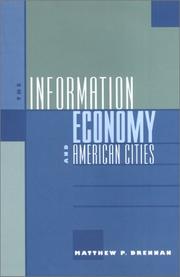Check nearby libraries
Buy this book

Annotation How can metropolitan regions remain prosperous and competitive in a rapidly changing economy? Challenging some long-standing assumptions, Matthew Drennan argues that those regions that have invested heavily in the information economy have done much better than those that continue to rely on manufacturing and industry as their base. Moreover, he contends, the benefits of that growth reach the urban working poor, earlier reports to the contrary notwithstanding. The Information Economy and American Cities provides a wealth of rigorously analyzed econometric data which will be of great value to economists, planners, and policymakers concerned with the future of America's metropolitan areas. Additional supporting data will be made available online. Not just another glib cheer for the information economy, this book provides the kind of hard evidence needed to advocate effectively for change.
Check nearby libraries
Buy this book

Previews available in: English
Subjects
Economics, Impact of science & technology on society, Urban & Regional, Information technology, Information Economics, Business & Economics, Sociology, United States, Business/Economics, USA, Metropolitan areas, Government & Business, Sociology - Urban, Business & Economics / Government & Business, Economic aspects, Urban Economics, Economic conditions, United states, economic conditions, Technologie de l'information, Aspect économique, Agglomérations urbaines, Économie urbaine, Conditions économiques, SOCIAL SCIENCE, Urban, Economic history, Informationsgesellschaft, Stadt, Wirtschaftliche LageShowing 1 featured edition. View all 1 editions?
| Edition | Availability |
|---|---|
|
1
The Information Economy and American Cities
June 10, 2002, The Johns Hopkins University Press
Hardcover
in English
080186934X 9780801869341
|
aaaa
Libraries near you:
WorldCat
|
Book Details
First Sentence
"In 1301, Philip IV of France and his queen, Joan of Navarra, visited the city of Bruges in their recently acquired territory, Flanders."
Classifications
The Physical Object
ID Numbers
Community Reviews (0)
Feedback?| August 11, 2024 | Edited by MARC Bot | import existing book |
| July 31, 2020 | Edited by ImportBot | import existing book |
| June 29, 2019 | Edited by MARC Bot | import existing book |
| January 10, 2019 | Edited by MARC Bot | import existing book |
| December 10, 2009 | Created by WorkBot | add works page |









